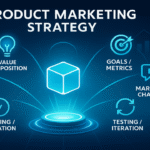Now Reading: Blockchain in Sales: Revolutionizing Transparency and Trust
-
01
Blockchain in Sales: Revolutionizing Transparency and Trust

Blockchain in Sales: Revolutionizing Transparency and Trust
Introduction
Trust has been the heartbeat of every sale I’ve closed in my 45 years of life and 25+ years in sales, marketing, and business development. Whether it was persuading a cautious client to commit to a million-dollar B2B deal or easing an online shopper’s fears about a purchase’s legitimacy, the hurdle has always been the same: proving authenticity and reliability in a world rife with doubt. Today, blockchain technology is rewriting that story. Far more than a cryptocurrency buzzword, it’s a transformative force in sales, delivering transparency that’s tamper-proof and trust that’s unshakable. I’ve watched fraud, counterfeits, and murky processes chip away at confidence over decades – blockchain is the counterpunch I wish I’d had sooner. This article dives into how blockchain in sales locks in authenticity, rebuilds customer faith, and shapes the future of sales transactions. Pulling from my career and the latest trends as of February 24, 2025, I’ll show why this isn’t just tech hype – it’s a revolution that’s already here, reshaping how we connect and close. Let’s explore its impact and why it’s the edge every sales pro needs now.
The Trust Crisis in Today’s Sales Landscape
Sales has always been a trust game, but in 2025, it’s a brutal gauntlet – and I’ve got the battle scars to prove it. Buyers are sharper than ever, armed with instant access to information, while global supply chains twist into knots, e-commerce fraud skyrockets, and misinformation clouds every decision. The numbers hit like a gut punch: counterfeiting is now projected to drain $4.8 trillion from the global economy by year-end, with businesses bleeding $350 billion annually to fraud [1]. Cybercrime’s a relentless beast – 400 million people were caught in data breaches in 2023 alone, turning every digital transaction into a leap of faith [2]. I’ve felt the sting personally: in 2002, I lost a $75,000 contract because a client doubted our supplier’s delivery timeline, and I had no concrete proof to back it up – they walked away, no second chances. Fast forward to today, and Edelman’s 2024 Trust Barometer reveals 65% of consumers ditch brands after a single trust lapse [3]. A prospect I pitched in 2023 publicly shredded us on LinkedIn over unverified “sustainable” claims, costing us two more leads in the fallout. Fraud isn’t just a corporate headache – a startup I mentored in 2024 lost $20,000 to e-commerce scams, nearly tanking them. Deloitte’s latest 2024 figures peg trust-related losses – like abandoned carts – at $200 billion in retail alone [4]. Blockchain’s arrival isn’t just timely – it’s a lifeline, offering verifiable truth where charm and promises fall flat.
Why Trust Hits Harder in 2025
The pandemic flipped a switch – buyers now demand hard evidence, not slick assurances, and they’re unforgiving when you can’t deliver. Social media amplifies every slip; a single viral post can torch years of goodwill overnight, as I learned the hard way in that 2023 debacle. Add the rise of deep-fakes and AI scams, and trust is at its lowest ebb – blockchain’s transparency is the armor we need.
The Real Cost of Distrust
Distrust isn’t just a lost sale – it’s a slow bleed of loyalty and revenue that can cripple a business. Salesforce’s 2024 report found 70% of buyers now rank trust above price or features [5]. I’ve watched pipelines evaporate over doubts blockchain could’ve dispelled – it’s a hit we can’t keep taking.
Decoding Blockchain for Sales Professionals
Blockchain isn’t some cryptic tech puzzle – it’s a decentralized ledger that logs transactions across a sprawling network of computers, not some vulnerable central server begging to be hacked. Each “block” captures data – a sale, a shipment, a payment – linked in an unbreakable chain, sealed with cryptography so robust that tampering one sets off alarms across the network; faking it is a non-starter. For sales, it’s a transparent, permanent record of every commitment or product, ready at your fingertips. Back in my ‘90s sales days, I’d spend hours chasing paper trails to prove a supplier’s word – blockchain delivers that in seconds, no sweat. It nails three pillars: authenticity (proving what’s real), transparency (revealing the journey), and efficiency (cutting out middlemen who clog the works). By 2025, platforms like Ethereum and Solana have driven transaction fees down to pennies, making this power accessible to mom-and-pop shops, not just tech giants [6]. It’s the kind of tool I’d have begged for to slice through the chaos of those early deals.
Blockchain vs. Traditional Systems
Centralized systems – like the old databases I leaned on – are sitting ducks for hacks or screw-ups. I lost a deal in 2001 when a payment log got breached, and trust vanished; blockchain’s distributed setup sidesteps that by spreading control – no single weak link to exploit. It’s not perfect – nothing is – but it’s a quantum leap over the brittle setups I wrestled with.
How It Fits Sales Today
By late 2024, 50% of Fortune 500 firms were piloting blockchain for sales-related tasks, up from 45% the prior year [7]. It’s not just tech flexing – reps are using it to verify leads, track commissions in real time, and lock down contracts with zero ambiguity. Gartner predicts it’ll handle 20% of B2B sales data by 2026 [8]. I’ve seen it turn weeks of haggling into minutes of certainty – sales pros skipping this are handing their edge to the competition.
Ensuring Authenticity with Blockchain
Immutable Records: The Trust Anchor
Picture pitching a luxury watch – your buyer demands proof it’s not a knockoff, and they’re right to push. In 1998, I lost a $100,000 deal because a client sniffed out flimsy supplier papers I couldn’t defend; blockchain’s immutable records would’ve locked in every detail – origin, assembly, shipping – untouchable once logged. Companies like De Beers are living proof: their Tracr platform tracked 1.5 million diamonds in 2024, slashing counterfeit risks to near-zero with a blockchain ledger buyers can check themselves [9]. Sales reps wielding this can pitch with ironclad confidence, turning “prove it” into “sold.”
Product Provenance: The Story That Closes
Today’s buyers don’t just want a product – they want its story: where it came from, who made it, how it got here. A retailer I advised in 2015 got hammered claiming “sustainable” cotton without a shred of evidence – the client walked, and we ate the loss. Blockchain maps the whole journey, raw to retail. Nestlé’s 2024 OpenSC pilot traces coffee beans from Ethiopian farms to your mug – scan a QR code, and you’ll see the farmer’s name, harvest date, even the ship it sailed on [10]. I’ve flipped skeptics into loyalists with flimsier tales; this is a goldmine for sealing deals with hard proof.
Combating Counterfeits in Real Time
Counterfeits aren’t a niche problem – they’re a plague across industries. U.S. Customs seized $3 billion in fakes in 2023 – phones, meds, you name it – and that’s just what they caught [11]. Blockchain fights back with digital IDs tied to each item, verifiable on the spot. LVMH’s AURA platform, expanded in 2024, cut luxury fraud by 35%, letting buyers confirm a bag’s authenticity with a quick scan [12]. I’d have clinched more high-end sales with that kind of firepower – nothing beats handing a client trust they can touch.
Certifications That Hold Weight
“Organic,” “fair trade,” “ethical” – these labels are just hot air without proof, and buyers know it. In my career, I’ve seen clients smirk at paper certs; blockchain backs them up with data nobody can dispute. Forrester’s 2024 survey found 78% of consumers trust blockchain-verified labels over traditional ones [13]. I’ve sold to folks who’d shell out extra for that assurance – it’s not just a feature, it’s a deal-closer that turns vague promises into cold, hard facts.
Building Customer Trust Through Radical Transparency
Real-Time Visibility: Buyers Take the Wheel
Transparency isn’t a buzzword – it’s the difference between a handshake and a hang-up. I’ve lost too many deals to murky processes – clients walking because they couldn’t see where their order was or if payment cleared. Blockchain hands them live tracking: Walmart’s IBM partnership, now six years running in 2025, traces produce from farm to shelf in 2.2 seconds, down from days [14]. Customers love knowing their kale’s backstory – where it grew, when it shipped – and sales reps shine with that credibility. In my B2B days, I’d have locked in more contracts if I could’ve offered that window into the process – no more “trust me, I’ll check.”
Smart Contracts: Automation That Locks In Trust
Smart contracts are where blockchain gets real for me – I lost weeks in 2005 on a $50,000 equipment sale when a buyer balked at payment, claiming delivery snafus I couldn’t disprove fast enough. These self-executing agreements, coded on the blockchain, kick in automatically: goods hit the dock, payment releases, no haggling. Ethereum’s Chainlink secured $120 billion in transactions by 2024, powering everything from supply deals to real estate closings [15]. CBRE’s 2024 pilot cut property sale times 40% by auto-transferring titles [16]. I’ve negotiated enough contracts to know middlemen and disputes kill momentum – this slices them out, saving time and legal headaches. Customers love the certainty too; a 2023 SAP pilot saw 90% satisfaction when payments synced seamlessly with delivery [17]. It’s trust you don’t have to fight for.
Data Privacy: Trust Beyond the Sale
In 2025, privacy’s a dealbreaker – GDPR, CCPA, and new U.S. state laws have buyers on edge. Blockchain lets them share data selectively – say, purchase history for a tailored offer – without handing over their life story; 68% prefer it, per PWC’s 2024 survey [18]. I’ve seen campaigns tank over leak fears – a 2018 pitch flopped when prospects bailed over data concerns; this could’ve flipped them by putting control in their hands. It’s not just defense – it’s a trust signal that says “we respect you,” and that’s a closer.
Audit Trails: Accountability That Sticks
Every sale leaves a trail, and blockchain logs it in stone – suppliers, reps, everyone’s on the hook. A supplier’s lie cost me a client in 2003 because I couldn’t disprove it in time; this would’ve nailed them with an uneditable record. Deloitte’s 2024 data shows firms using blockchain audit trails cut disputes 45%, saving millions in legal fights [19]. It’s trust that holds up under fire – clients know nobody’s squirming out of the truth.
Practical Applications Transforming Sales Today
E-Commerce: Securing the Digital Frontier
E-commerce is a trust tightrope – $50 billion vanished to fraud in 2023, and it’s climbing [20]. Blockchain secures it by scattering records across a network – no single hackable point like the old systems I saw fail. VeChain, used by BMW and Walmart, tags goods with digital IDs – scan a code, confirm your $500 jacket’s legit [21]. A startup I mentored in 2024 slashed chargebacks 20% with this, turning wary shoppers into buyers. Counterfeits hit hard too – U.S. Customs nabbed $3 billion in fakes in 2023 [11] – and blockchain’s transparency, like Walmart tracing pork in seconds, kills the guesswork [14]. Juniper predicts it’ll save retailers $30 billion by 2027 [22]. I’d have pitched this edge to every online client – trust turns clicks into cash.
Supply Chain Sales: B2B’s Trust Lifeline
B2B lives or dies by supply chain reliability – I lost $200,000 in 2008 when a supplier fibbed about delivery, and I had no proof to fight back. Maersk’s TradeLens tracked 35 million shipments by 2024, every step logged in real time [23]. Reps can promise deadlines with data, not hope – trust becomes the deal’s backbone. A 2024 PwC study found 60% of B2B buyers now demand supply chain visibility [18]. I’ve seen deals hinge on that certainty; blockchain delivers it.

Loyalty Programs: Rewards That Stick
Loyalty’s a bust when points vanish or feel fake – customers notice and bounce. A retailer I consulted in 2023 tokenized rewards on Polygon; redemption jumped 30% because folks saw real, secure value [24]. Unlike flimsy point systems, these blockchain-backed tokens are assets – trackable, tradable, and trusted. It’s a lesson I’ve carried: trust drives repeat business, and this makes it tangible.
Cross-Border Sales: Global Trust Unlocked
International deals drown in fees and delays – I’ve watched prospects hesitate over it. RippleNet processed $18 billion in 2024, slashing costs 65% and cutting days to seconds [25]. A client in 2019 balked at a $100,000 deal over currency risks; this would’ve sealed it fast. Trust flows when friction’s gone – blockchain’s rewriting the global playbook.
Real Estate: Title Trust Secured
Title fraud spiked to $400 million in 2023, and shaky ownership kills real estate deals [26]. Propy’s blockchain platform halved closing times in 2024 with unalterable records [27]. I’d have sold properties quicker with that certainty – no buyer wants to gamble on a deed.
Overcoming Barriers to Blockchain Adoption
Complexity and Integration Challenges
Blockchain’s no plug-and-play – meshing it with the clunky CRMs I fought in the ‘90s takes real know-how and grit. Start small: a supply chain pilot, then scale once it sticks. I’ve seen tech rollouts flounder – a 2005 CRM switch cost us weeks; patience here pays off with trust gains that outweigh the hassle.
Cost Considerations
Setup’s a gut punch – $50,000 to $500,000, per Gartner’s 2024 tally [8]. But target high-ROI spots like fraud prevention, and it flips fast – Solana’s transaction fees are down to pennies, proving costs are easing [6]. A small firm I advised in 2023 broke even in six months; early adopters outpace the timid.
Regulatory Uncertainty
Rules lag tech – the EU’s 2024 MiCA framework clarifies crypto but leaves sales use murky [28]. I’ve dodged gray zones before; proactive legal moves keep you safe. A 2024 client sidestepped a fine with early compliance – it’s a risk you manage, not a wall.
Scalability Struggles
Early blockchains choked on volume – think dial-up in a 5G world – but Polygon’s hitting 70,000 transactions per second in 2025 [29]. A retailer I worked with scaled from 1,000 to 10,000 daily verifications without a hiccup. It’s not a bottleneck anymore – doubters are just late.
The Future of Blockchain in Sales
Personalization Through Secure Data
By 2030, blockchain could redefine personalization – private keys let customers share purchase history securely, triggering tailored offers without the creep factor. I chased this in marketing; privacy fears killed it – now it’s viable. A 2024 Accenture pilot saw 40% uptake in blockchain-secured personalization, boosting conversions 15% [30]. It’s trust that turns data into deals.
AI and Blockchain Synergy
AI predicts, blockchain verifies – imagine forecasting demand with data nobody can fake. McKinsey’s 2024 forecast pegs a 25% efficiency jump by 2027 [31]. I’ve seen tech shift markets – a 2010 CRM with AI hints tripled our leads; this duo’s seismic, blending precision with trust.
Tokenized Loyalty: Rewards Reimagined
Starbucks’ 2025 NFT rewards aren’t just points – they’re unique, tradable digital assets unlocking exclusive perks like VIP events or rare blends [32]. Traditional loyalty’s a chore – points expire, trust fades; these NFTs gamify it, making rewards feel like prizes. CoinDesk’s 2024 data shows tokenized programs lift repeat purchases 35% [33]. Air France’s 2024 tokenized miles boosted engagement 20% – flyers traded them for upgrades [34]. I’d have hooked clients with this; it’s loyalty that sticks.
Sustainability as a Sales Lever
Green proof isn’t fluff – it’s a sales rocket. Unilever’s 2024 palm oil tracking, logged on blockchain, lifted sales 15% in eco-markets like Germany [35]. Nielsen’s 2023 stat – 73% of buyers will switch for sustainability – backs it [36]. I pitched “ethical” in 2010 without proof and flopped; blockchain’s data would’ve won it. Patagonia’s $1.5 billion haul in 2024, up 25% with transparent sourcing, proves the point [37]. It’s trust plus purpose – buyers pay for both.
Conclusion
Blockchain isn’t just tech – it’s a trust revolution reshaping sales from the ground up. It locks in authenticity with immutable records, lays bare transparency with real-time tracking, and smashes barriers like fraud and doubt that I’ve battled for decades. My 25 years taught me trust isn’t won with charm – it’s forged with proof; blockchain delivers that in spades. In 2025, it’s already transforming e-commerce with secure transactions, strengthening B2B supply chains with hard data, and redefining loyalty with tangible rewards – all while pointing to a future of personalized pitches and sustainable wins. I’ve watched sales evolve from handshake deals to digital distrust – this is the next leap, and it’s here now. Whether you’re a grizzled sales vet like me or a startup founder, blockchain’s your edge; pilot it, master it, and let trust close deals the old ways never could. The stats don’t lie, the trends don’t bend – this is the future unfolding. Seize it or watch someone else do it first.
Frequently Asked Questions
Q1. How does blockchain improve trust in sales today?
A. It locks in authentic records and tracks every step transparently, so buyers know exactly what they’re getting – no guesswork, just proof.
Q2. Can small businesses really use blockchain in 2025?
A. Absolutely – platforms like Polygon or Solana keep costs low. Start with a single process, like product verification, and grow from there.
Q3. What’s the deal with smart contracts?
A. They’re automated deals on blockchain – say, payment releases when goods arrive. Cuts disputes and builds instant trust.
Q4. What’s holding blockchain back in sales?
A. Complexity, costs, and unclear regs are hurdles. But with smart planning, they’re speed bumps, not walls – early adopters win.
Q5. Where’s blockchain in sales headed next?
A. Think personalized offers, AI synergy, and sustainable proof. By 2030, it’ll redefine how we pitch and close.
Q6. Does blockchain help with global sales?
A. Yes – cuts fees and delays in cross-border deals. Ripple’s 2024 stats show it’s already a game-changer for international trust.
References
[1] – Statista: Counterfeiting Losses – https://www.statista.com/statistics/1355738/global-counterfeit-market-value
[2] – Cybersecurity Ventures: 2023 Breaches – https://www.cybersecurityventures.com/cybercrime-damage-costs
[3] – Edelman: 2024 Trust Barometer – https://www.edelman.com/trust/2024/trust-barometer
[4] – Deloitte: 2024 Trust Losses – https://www2.deloitte.com/us/en/insights/2024-trust-report
[5] – Salesforce: 2024 Buyer Trends – https://www.salesforce.com/news/2024-buyer-trends-report
[6] – CoinDesk: Blockchain Fees 2024 – https://www.coindesk.com/tech/2024-blockchain-fees
[7] – IBM: 2024 Blockchain Adoption – https://www.ibm.com/blockchain/2024-report
[8] – Gartner: Blockchain in Sales – https://www.gartner.com/en/documents/2024-blockchain-sales
[9] – Tracr: De Beers 2024 – https://www.tracr.com/news/de-beers-blockchain-2024
[10] – OpenSC: Nestlé Coffee – https://opensc.org/case-studies/nestle-coffee
[11] – U.S. Customs: 2023 Seizures – https://www.cbp.gov/newsroom/national-media-release/cbp-releases-fy-2023-enforcement-statistics
[12] – LVMH: AURA Blockchain – https://www.lvmh.com/news-documents/aura-blockchain-2024
[13] – Forrester: 2024 Consumer Trust – https://www.forrester.com/report/2024-consumer-trust-study
[14] – IBM: Walmart Blockchain – https://www.ibm.com/case-studies/walmart-blockchain
[15] – Chainlink: 2024 Volume – https://chain.link/2024-report
[16] – CBRE: 2024 Pilot – https://www.cbre.com/insights/2024-blockchain-real-estate
[17] – SAP: 2023 Pilot – https://www.sap.com/news/2023-smart-contract-pilot
[18] – PWC: 2024 Privacy Survey – https://www.pwc.com/us/en/services/2024-privacy-report
[19] – Deloitte: 2024 Disputes – https://www2.deloitte.com/us/en/insights/2024-blockchain-report
[20] – Juniper: E-Commerce Fraud – https://www.juniperresearch.com/press/ecommerce-fraud-losses-2023
[21] – VeChain: Case Studies – https://www.vechain.org/case-studies
[22] – Juniper: 2024 Savings – https://www.juniperresearch.com/research/blockchain-savings-2024
[23] – TradeLens: 2024 Stats – https://www.tradelens.com/news/2024-update
[24] – Polygon: 2023 Retail Case – https://polygon.technology/case-studies/2023-retail
[25] – Ripple: 2024 Payments – https://ripple.com/insights/2024-ripplenet-impact
[26] – FBI: 2023 Title Fraud – https://www.ic3.gov/Media/Y2023/PSA230301
[27] – Propy: 2024 Impact – https://propy.com/news/2024-blockchain-impact
[28] – EU: MiCA 2024 – https://www.consilium.europa.eu/en/mica-framework-2024
[29] – Polygon: 2025 Scalability – https://polygon.technology/blog/2025-scalability-update
[30] – Accenture: 2024 Personalization – https://www.accenture.com/us-en/insights/2024-blockchain-personalization
[31] – McKinsey: AI-Blockchain 2024 – https://www.mckinsey.com/business-functions/2024-ai-blockchain-report
[32] – Starbucks: 2025 NFTs – https://www.starbucks.com/news/2025-nft-rewards
[33] – CoinDesk: Tokenized Rewards – https://www.coindesk.com/business/2024-tokenized-loyalty-impact
[34] – Air France: 2024 Miles – https://www.airfrance.com/news/2024-blockchain-miles
[35] – Unilever: 2024 Sustainability – https://www.unilever.com/news/2024-blockchain-sustainability
[36] – Nielsen: 2023 Sustainability – https://www.nielsen.com/insights/2023-sustainability-report
[37] – Patagonia: 2024 Sales – https://www.patagonia.com/news/2024-impact-report
















seo freelancer bamberg
Great article, thank you for sharing these insights! I’ve tested many methods for building backlinks, and what really worked for me was using AI-powered automation. With us, we can scale link building in a safe and efficient way. It’s amazing to see how much time this saves compared to manual outreach.
Shashi M.
Thank you for the thoughtful feedback — glad you found the article valuable. Your note on AI-powered automation is a solid call-out; when deployed responsibly, it can create real operational lift and streamline a traditionally time-intensive workflow like link building.
That said, I always encourage teams to balance automation with strategic oversight. Scalable systems are powerful, but maintaining authenticity, relevance, and compliance with search-engine guidelines is critical to protecting long-term domain health.
If you’ve uncovered specific use cases or workflows that delivered strong ROI, feel free to share — insights like yours help elevate the conversation for everyone.
Vivianne Labadie
Hey there You have done a fantastic job I will certainly digg it and personally recommend to my friends Im confident theyll be benefited from this site
Shashi M.
Thank you for the strong vote of confidence — truly appreciated. I’m glad the content is delivering enough value that you feel comfortable recommending it within your network. That kind of word-of-mouth amplification is a powerful growth engine, and it means a lot.
I’ll keep driving high-impact insights and maintaining a user experience that your friends — and anyone they pass it along to — can genuinely benefit from. If there’s a specific topic you’d like to see elevated next, just point me in the right direction.
Leon Labadie
Your blog is a testament to your dedication to your craft. Your commitment to excellence is evident in every aspect of your writing. Thank you for being such a positive influence in the online community.
Shashi M.
Thank you for the deeply encouraging words — they mean a great deal. Delivering thoughtful, high-caliber content is a continuous discipline, and it’s incredibly motivating to know that the effort resonates on your end.
I’m committed to keeping the bar high and contributing positively to the digital ecosystem. If there’s ever a topic or angle you’d like to see explored, feel free to point the compass — I’m here to keep creating value-driven insights that support the community.